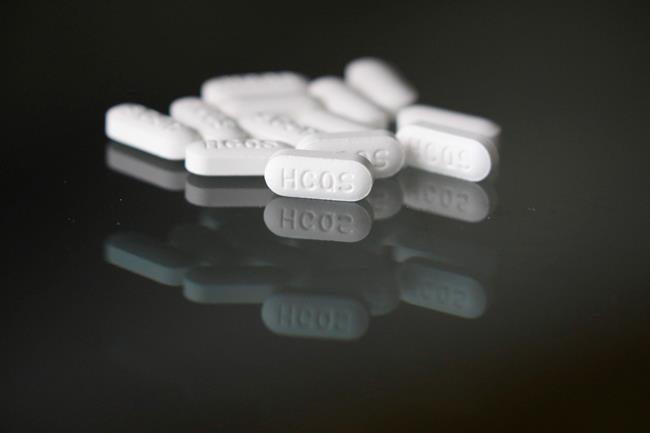More deaths, no benefit from malaria drug in VA virus study
Advertisement
Read this article for free:
or
Already have an account? Log in here »
To continue reading, please subscribe:
Monthly Digital Subscription
$0 for the first 4 weeks*
- Enjoy unlimited reading on winnipegfreepress.com
- Read the E-Edition, our digital replica newspaper
- Access News Break, our award-winning app
- Play interactive puzzles
*No charge for 4 weeks then price increases to the regular rate of $19.00 plus GST every four weeks. Offer available to new and qualified returning subscribers only. Cancel any time.
Monthly Digital Subscription
$4.75/week*
- Enjoy unlimited reading on winnipegfreepress.com
- Read the E-Edition, our digital replica newspaper
- Access News Break, our award-winning app
- Play interactive puzzles
*Billed as $19 plus GST every four weeks. Cancel any time.
To continue reading, please subscribe:
Add Free Press access to your Brandon Sun subscription for only an additional
$1 for the first 4 weeks*
*Your next subscription payment will increase by $1.00 and you will be charged $16.99 plus GST for four weeks. After four weeks, your payment will increase to $23.99 plus GST every four weeks.
Read unlimited articles for free today:
or
Already have an account? Log in here »
Hey there, time traveller!
This article was published 21/04/2020 (2071 days ago), so information in it may no longer be current.
A malaria drug widely touted by President Donald Trump for treating the new coronavirus showed no benefit in a large analysis of its use in U.S. veterans hospitals. There were more deaths among those given hydroxychloroquine versus standard care, researchers reported.
The nationwide study was not a rigorous experiment. But with 368 patients, it’s the largest look so far of hydroxychloroquine with or without the antibiotic azithromycin for COVID-19, which has killed more than 171,000 people as of Tuesday.
The study was posted on an online site for researchers and has not been reviewed by other scientists. Grants from the National Institutes of Health and the University of Virginia paid for the work.

Researchers analyzed medical records of 368 male veterans hospitalized with confirmed coronavirus infection at Veterans Health Administration medical centres who died or were discharged by April 11.
About 28% who were given hydroxychloroquine plus usual care died, versus 11% of those getting routine care alone. About 22% of those getting the drug plus azithromycin died too, but the difference between that group and usual care was not considered large enough to rule out other factors that could have affected survival.
Hydroxychloroquine made no difference in the need for a breathing machine, either.
Researchers did not track side effects, but noted a hint that hydroxychloroquine might have damaged other organs. The drug has long been known to have potentially serious side effects, including altering the heartbeat in a way that could lead to sudden death.
Earlier this month, scientists in Brazil stopped part of a study testing chloroquine, an older drug similar to hydroxychloroquine, after heart rhythm problems developed in one-quarter of people given the higher of two doses being tested.
On Tuesday, NIH issued new treatment guidelines from a panel of experts, saying there was not enough evidence to recommend for or against chloroquine or hydroxychloroquine for COVID-19. But it also advised against using hydroxychloroquine with azithromycin because of the potential side effects.
Many doctors have been leery of the drug.
At the University of Wisconsin, Madison, “I think we’re all rather underwhelmed” at what’s been seen among the few patients there who’ve tried it, said Dr. Nasia Safdar, medical director of infection control and prevention.
Patients asked about it soon after Trump started promoting its use, “but now I think that people have realized we don’t know if it works or not” and needs more study, said Safdar, who had no role in the VA analysis.
The NIH and others have more rigorous tests underway.
___
Marilynn Marchione can be followed on Twitter: @MMarchioneAP
___
The Associated Press Health and Science Department receives support from the Howard Hughes Medical Institute’s Department of Science Education. The AP is solely responsible for all content.


